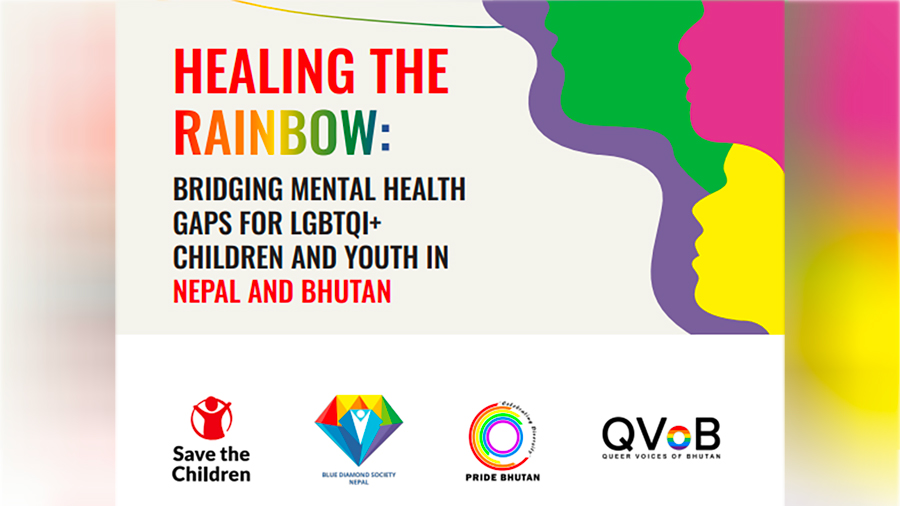 Over 76 per cent of Lesbian, Gay, Bisexual, Transgender, Queer, and Intersex or LGBTQI+ children and youth in Bhutan have experienced depression or anxiety at some point in their lives. This is according to a recent Save the Children report. It shows that mental health issues were more prevalent among those aged 15 to 17, and 20 to 24 years old.
Over 76 per cent of Lesbian, Gay, Bisexual, Transgender, Queer, and Intersex or LGBTQI+ children and youth in Bhutan have experienced depression or anxiety at some point in their lives. This is according to a recent Save the Children report. It shows that mental health issues were more prevalent among those aged 15 to 17, and 20 to 24 years old.
The previous government decriminalised consensual same-sex relationships in 2021 taking a significant step toward protecting LGBTQI+ individuals.
Despite these reforms, the report states that there is an urgent need to address the mental health of queer children and youth in Bhutan and provide targeted mental health interventions and policies.
The report titled Healing the Rainbow: Bridging Mental Health Gaps for LGBTQI+ Children and Youth in Nepal and Bhutan, collected data from 120 LGBTQI+ children and youth across 14 districts. Data were also collected from Kathmandu valley in Nepal.
Mental health issues were more commonly reported among rural residents at 79 per cent compared to those in towns at 76 per cent and municipalities at 68.4 per cent.
Notably, 25 per cent of LGBTQI+ youth in Bhutan reported facing discrimination from mental health providers due to their identity, contributing to a trust deficit.
Furthermore, over half of the respondents in Bhutan and Nepal felt the need to educate their service providers about LGBTQI+ issues.
74 per cent of Bhutanese LGBTQI+ youth had never accessed formal mental health services. Reasons included mental health professionals lacking awareness and knowledge on LGBTQI+ issues, the absence of culturally competent or LGBTQI+-affirming providers, breach of privacy and confidentiality, and experiences of stigma and discrimination.
The report reveals that professional mental health support remained underutilised, with fewer LGBTQI+ youth in the country seeking formal care compared to their counterparts in Nepal.
Even if they came to seek mental health support, the most commonly cited reasons included bullying and stigma, understanding gender identity, coming out to family and friends, and navigating gender dysphoria.
The report recommends governments to revise mental health policies to explicitly address the intersecting factors affecting LGBTQI+ individuals, including gender identity, sexual orientation, ability, ethnicity, and socioeconomic status.
It also recommends allocating a dedicated budget to support mental health interventions, providing free or subsidised mental health care for LGBTQI+ youth, from economically disadvantaged backgrounds and capacity Building for Mental Health Providers among others.
However, awareness of mental health issues was generally high across all age groups, particularly among younger, gender-expansive youth.
While youth aged 20-24 had the highest awareness of available mental health services, those aged 15-17, along with rural youth and individuals without formal education, showed significantly lower awareness.
According to the report, LGBTQI+ youth in Bhutan primarily received mental health awareness through non-governmental and civil society organisations, followed by community-based initiatives and government health centres.
Save the Children, in collaboration with Blue Diamond Society Nepal, Pride Bhutan, and Queer Voices of Bhutan, conducted this research to assess the mental health needs of LGBTQI+ children and youth in Nepal and Bhutan.
Despite progress in decriminalising same-sex relationships, systemic barriers such as limited awareness, stigma, discrimination, and a lack of LGBTQI+ affirming mental health services continue to hinder access to care.
Sonam Yuden








